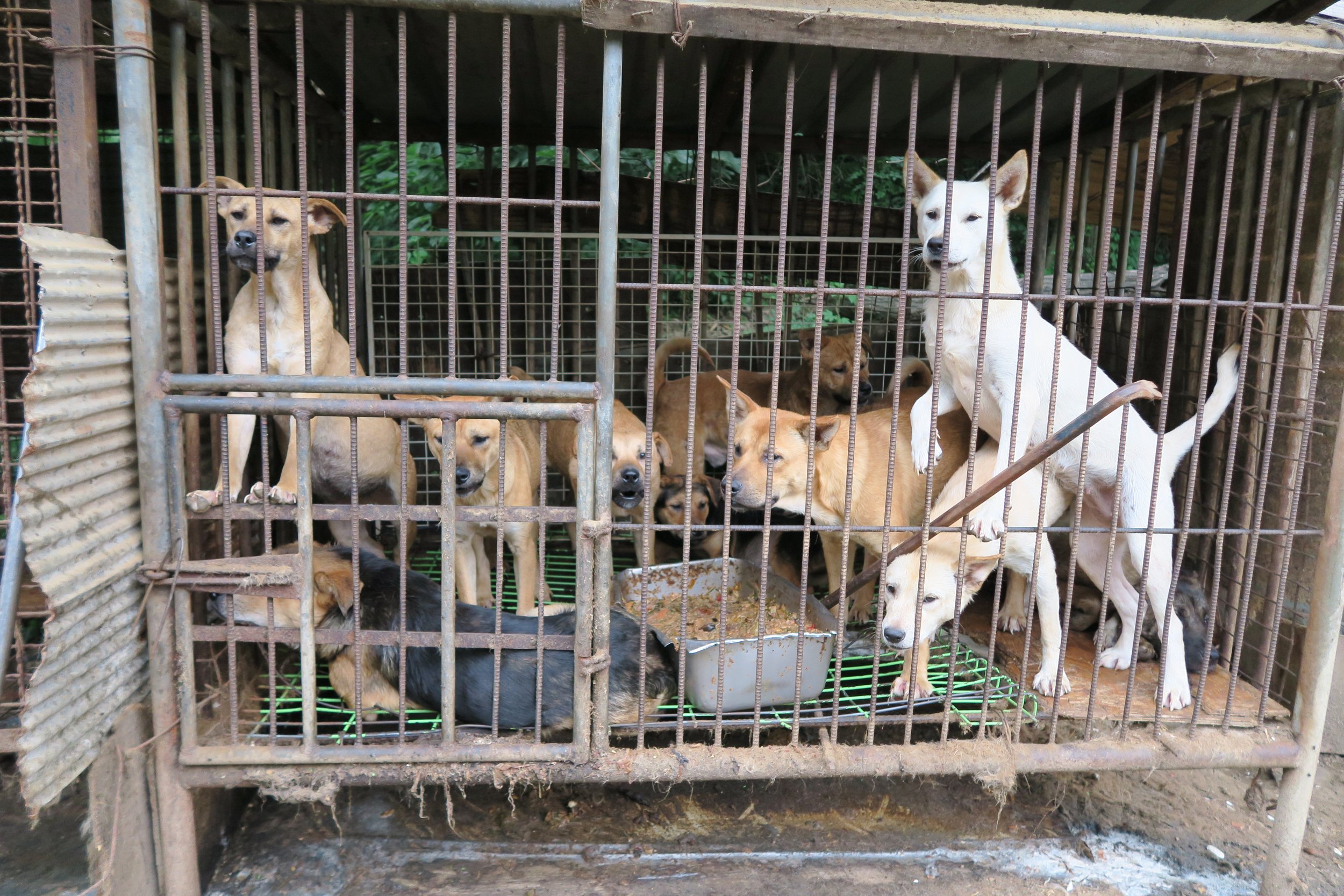
Let’s end the dog meat trade.
Education. Advocacy. Rescue. Together.
The dog-meat trade is not an easy subject.
It calls up several issues—from the morals of meat eating to the necessity for cultural sensitivity to the economic implications of an industry. The following sections tell you a little bit about the history, the reality and status of the dog-meat trade today.
At DoVE Project, we believe we have to consider all of these to have any hope of creating a dialogue that leads to change.
The history and culture of dog-meat.
It may seem straightforward that eating what most consider "man's best friend" is bad, abhorrent even. Dogs, after all, have been a part of our households for thousands of years, serving as royal pets in Egypt and France, trusty herders across Europe and America and, today, lovable family members everywhere.
Eating dog, however, has been a part of many societies for tens of thousands of years. Dog bones have been found in early Stone Age excavations and cave paintings depicting dogs as meat have been found in parts of Korea.(1) And--we are generally a world of meat-eaters. The US ranks second in the world, in fact, for meat consumption at 270 lbs./per capita.(2) That's more than twice the world average and equal to a whole lot of cows, chickens, pigs and rabbits.
While most associated with Asia, one recent article describes nine different countries where dogs are reportedly still eaten for meat, from the Arctic to parts of Mexico and Switzerland, and are sometimes the only meat source for a population.(3)
Culturally in Asia, dog-meat has been thought to have certain medicinal properties and been associated with festivals. In China, dog meat is thought to have a "warming" energy that helps in winter, in Korea it is thought to have a cooling energy that is helpful during the hottest days of summer.(5)
There is a seasonal tradition in South Korea called Sambok (三伏) , at which Koreans traditionally eat Boshintang, a soup containing dog-meat.(1) Each year in June, the Chinese city of Yulin hosts a dog meat festival where live dogs and cats are sold specifically for eating and an estimated 10,000 are slaughtered for their meat. While many dogs are raised for this purpose, often strays are collected or pets are stolen then sold.
The Reality of the dog-meat trade today.
History and complexity aside, the daily reality of the dog meat trade is simple. And harsh. Dogs are typically slaughtered by electrocution, strangulation by hanging or beating them to death. Some are still alive when blow-torched or thrown in boiling water to remove their fur.(1)
HOW CAN THIS BE?
First, in South Korea, there has been a historic, cultural belief that meat dogs are a different and lesser kind of dog than pets or pure-breeds. Furthermore, and more difficult to tolerate, it's believed that torturing the animals increases their flavor and potency.
Add to this that dog meat sits in a gray area of Korean food and sanitation laws dating from the 1960's. There are no laws that govern humane slaughter of dog meat and it is actually excluded from the list of livestock under the Livestock Processing Act of 1962.(1) Because of this some believe that dog meat should be expressly legalized so that butchers can be certified to deal with the meat in more humane and sanitary ways—much like the meat-packing industry in the United States in 1906.(6) Others argue that the practice of slaughtering and eating dog meat should be banned by law.
HOW MUCH DOES IT HAPPEN?
Estimates vary widely and we are working to validate the numbers. Some activist groups claim as many as 30 million dogs a year (mostly wild or stolen) are killed across Asia. A NY Times article from 2016 about the dog-meat trade in South Korea states, "Each year, more than 17,000 dog farms, some of them raising more than 1,000 animals each, supply 2 million dogs to meet the country’s centuries-old appetite for dog meat."
In 2010, the Korean Statistics Information Service reported 892,820 dogs in 100,191 farms, which equals 8.9 dogs per farm.(1) A South Korean activist group puts the estimate at 2.5 million dogs slaughtered in South Korea every year.(1)
Where do things stand now?
There are some signs of progress toward changing the dog-meat industry across Asia, but there is much work to do. Culture, politics, social rights and economics all make the issue controversial and complicated to end.
In April of 2017, Taiwan became the first Asian nation to fully outlaw the consumption of dog and cat meat, which is an important first step. Dog-meat consumption is on the rise, however, in Indonesia.(N1) Remarkably, dog-meat is still legal in 44 states in the US. There is a House resolution that would outlaw it, but it requires continued attention to make its way through to law.
In South Korea, the approach of the 2018 Winter Olympics in Seoul is shining a spotlight on the issue. The slaughter facility and live dog meat cages at the biggest dog meat market in Seongnam were eliminated in February as part of a wider expected crackdown.(N2) There is also political pressure coming from the UK and the United States as a result of active lobbying by citizens and groups like DoVE Project. The mayor of Seoul recently announced that dog meat markets in Seoul would be abolished by the end of 2017.
During our team's visit to South Korea in January, we interviewed many people on the street to understand the knowledge and opinions of the dog-meat trade. Surprisingly, many were unaware either that it still exists or the conditions in which it operates. Of those who acknowledged it, they either grossly underestimated the size of the industry or were reticent to criticize it or even evaluate their own point of view on it.
In South Korea, DoVE is working with local and federal government officials, animal advocacy groups, individual farmers and business groups to effect change. In the US, DoVE also collaborates with national and local advocacy groups as well as South Korea's Consulate General in Los Angeles and New York City.
“There are many ways to work with us in the pursuit to end this inhumane industry. Please view the ways to get involved, learn more about our team or contact us to talk. Together we can end the dog-meat trade.”
We appreciate your support! - Tami and Claudia
DoVE Project is a 501(c)3 organization founded in August 2016.



